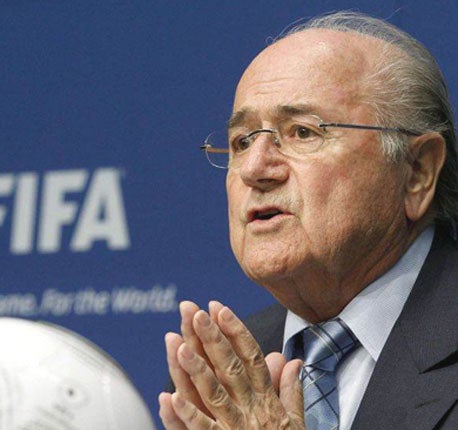James Lawton: Money is Blatter's oxygen and only sponsors can cut supply
Sooner rather than later it will be pointed out that a shoddy image is going to be deemed untenable by those who care more about their product than football

Sepp Blatter wanted to know, "What crisis?" He knows now in the lingua franca of his scandal-raddled Fifa: the language of money.
It is being spoken not by the Football Association, so suddenly caught up in a bout of selective morality, or various sports ministers seizing on a no-risk issue, but the only people with a chance of breaking the glacial indifference of the president of world football's governing body to all charges of corruption.
The men who control so much of Fifa's revenue in the offices of sponsors like Coca Cola, Emirates airlines, Adidas and Visa are now coming out of the corporate woodwork.
There are no ultimatums, not yet, but a rising volume of concern and dissatisfaction guaranteed to bring a cold sweat to the man who has ruled international football for 13 years – and who today in Zurich expects to be voted by acclamation into another four years.
The FA, who so recently were attempting to stifle investigations into Fifa corruption, are urging fellow national associations to vote down Blatter but almost everyone else knows they might just as well campaign for a world government.
It is only the sponsors who can hurt Blatter in any way he might readily recognise.
He has had plenty of time to make his alliances, and stitch up anyone with the nerve to challenge his power, but it is not an inexpensive exercise. Money is Blatter's oxygen, of course, and now for the first time there are clear indications that if it isn't immediately imperilled, sooner rather than later it will be pointed out that a progressively shoddy image is going to be deemed untenable by those who care more passionately about their product than the world's most popular game.
So far the sponsorship pressure is relatively low-key. There is public confidence that Blatter can find a way out of his corner. Privately, there is a growing sense of contributing to a disaster fund.
One of the first alarms has come from Coca Cola's Atlanta headquarters and there is a good reason for this. The company's huge resources are widely believed to have been crucial in tempting the 1996 Olympics to Atlanta rather than Athens, the favourite choice of all those who wanted to see the centenary of the modern Games in the place of its birth.
The consequence was a public relations disaster. Atlanta was derided as an ultimate example of the greening of sport, a pursuit of profit that put the prestigious magazine Sports Illustrated in mind of a cheap bazaar.
Within a few years the Olympics were in danger of breaking apart with a barrage of claims that the Winter Olympics of Salt Lake City in 1992 had been bought. Ten members of the International Olympic Committee were expelled, 10 were censured and from that point the Olympics realised something that still appears beyond the comprehension of the rulers of Fifa despite the mounting allegations about Qatar's successful bid for the 2022 World Cup.
It was that sooner or later even an event as celebrated and compelling as the Olympics had the capacity to destroy itself. In Salt Lake that message was underpinned by several stories of bribes that included free skiing trips, college scholarships, Super Bowl tickets and even plastic surgery.
The IOC, faced with the disquiet of sponsors, realised it had to change or die. A new transparency was not an ethical priority but a basic business consideration. The tentacles went far beyond the Salt Lake bid. It was found that Nagano, who beat Salt Lake in the bidding for 1998, had also lavished entertainment and gifts on IOC voters on a budget that stretched into millions of dollars.
IOC president, Juan Antonio Samaranch, an earlier Blatter model with Fascist leanings, fought a desperate battle to maintain his long-established power but it was one of much greater subtlety than his football counterpart has yet to produce.
Blatter may now be contemplating a similar challenge; not an epiphany but a gut instinct for survival. The alternative, under the pressure of discontented sponsors, may be the one provided for Samaranch by the organisers of the Nagano games when they handed him a rather expensive Samurai sword.
Samaranch was skilful enough not to have to fall on it. In the case of Blatter there may be no such guarantee.
Subscribe to Independent Premium to bookmark this article
Want to bookmark your favourite articles and stories to read or reference later? Start your Independent Premium subscription today.

Join our commenting forum
Join thought-provoking conversations, follow other Independent readers and see their replies